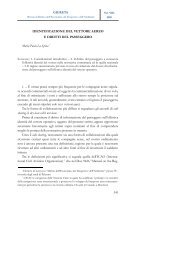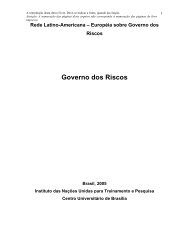The Old and the New Limits to Freedom of Contract in Europe
The Old and the New Limits to Freedom of Contract in Europe
The Old and the New Limits to Freedom of Contract in Europe
You also want an ePaper? Increase the reach of your titles
YUMPU automatically turns print PDFs into web optimized ePapers that Google loves.
ERCL 2/2006 <strong>The</strong> <strong>Old</strong> <strong>and</strong> <strong>the</strong> <strong>New</strong> <strong>Limits</strong> <strong>to</strong> <strong>Freedom</strong> <strong>of</strong> <strong>Contract</strong> <strong>in</strong> <strong>Europe</strong><br />
269<br />
produces <strong>in</strong>determ<strong>in</strong>ate <strong>and</strong>/or unclear outcomes <strong>in</strong> terms <strong>of</strong> social justice,<br />
but also sets <strong>the</strong> stage for <strong>the</strong> perfectionist model.<br />
3. <strong>The</strong> Perfectionist Model<br />
In <strong>the</strong> paternalist model <strong>the</strong> state <strong>in</strong>terferes with an <strong>in</strong>dividual’s choice <strong>in</strong><br />
order <strong>to</strong> give effect <strong>to</strong> his true desires: <strong>the</strong> underly<strong>in</strong>g assumption is that <strong>the</strong><br />
<strong>in</strong>dividual’s judgement is clouded by mental biases or weakness <strong>of</strong> <strong>the</strong> will. In<br />
o<strong>the</strong>r words <strong>the</strong> subject is unable <strong>to</strong> identify <strong>and</strong> pursue his preferences.<br />
Recently on <strong>the</strong> <strong>Europe</strong>an stage we f<strong>in</strong>d a harder k<strong>in</strong>d <strong>of</strong> paternalism, that<br />
<strong>the</strong>orists <strong>of</strong> ethics call perfectionism. Accord<strong>in</strong>g <strong>to</strong> this <strong>the</strong>ory, <strong>the</strong> <strong>in</strong>terference<br />
<strong>of</strong> <strong>the</strong> state with <strong>the</strong> person’s choice is justified by <strong>the</strong> circumstance<br />
that <strong>the</strong> subject has a wrong set <strong>of</strong> preferences. Here <strong>the</strong> state enunciates a<br />
conception <strong>of</strong> <strong>the</strong> good life <strong>and</strong> frowns on choices which are <strong>in</strong>consistent<br />
with it!<br />
While paternalism restricts our barga<strong>in</strong><strong>in</strong>g freedom only <strong>in</strong> <strong>the</strong> name <strong>of</strong> satisfy<strong>in</strong>g<br />
our deepest set <strong>of</strong> preferences, <strong>the</strong> perfectionist is a moralist who is prepared<br />
<strong>to</strong> ignore our deepest wishes when <strong>the</strong>se are deemed unworthy. Instead<br />
he identifies <strong>the</strong> good ends we have <strong>to</strong> pursue <strong>and</strong> obliges us <strong>to</strong> seek <strong>the</strong>m,<br />
whe<strong>the</strong>r we want <strong>the</strong>m or not. 33<br />
<strong>The</strong> perfectionist option is currently imposed by German <strong>and</strong> French courts<br />
when <strong>the</strong>y restrict freedom <strong>of</strong> contract <strong>in</strong> <strong>the</strong> name <strong>of</strong> human dignity. Unlike<br />
paternalism, which deploys general clauses whose content is his<strong>to</strong>rically <strong>and</strong><br />
socially determ<strong>in</strong>ed (thus relative), this perfectionist pattern relies on a pr<strong>in</strong>ciple<br />
which is supposed <strong>to</strong> be absolute, transcendent <strong>and</strong> pre-exist<strong>in</strong>g <strong>to</strong> any<br />
political or social experience.<br />
a) <strong>The</strong> pr<strong>in</strong>ciple <strong>of</strong> human dignity<br />
In <strong>the</strong> constitutional traditions <strong>of</strong> EU Member States we f<strong>in</strong>d two different<br />
notions <strong>of</strong> dignity: social dignity <strong>and</strong> human dignity. <strong>The</strong> notion <strong>of</strong> social<br />
dignity refers <strong>to</strong> <strong>the</strong> right <strong>to</strong> a dignified life <strong>in</strong> terms <strong>of</strong> material <strong>and</strong> economic<br />
conditions. It has a positivist essence, implies a commitment <strong>to</strong> distributive<br />
policies <strong>and</strong> aims <strong>to</strong> achieve social justice <strong>and</strong> equality. <strong>The</strong> notion <strong>of</strong> human<br />
dignity is <strong>to</strong>day overwhelm<strong>in</strong>g. It has a natural law essence, pre-exists <strong>the</strong><br />
State <strong>and</strong> its law, <strong>and</strong> has several possible mean<strong>in</strong>gs, merg<strong>in</strong>g with <strong>in</strong>dividual<br />
freedom, au<strong>to</strong>nomy <strong>and</strong> self-determ<strong>in</strong>ation on <strong>the</strong> one h<strong>and</strong>, with <strong>the</strong> protection<br />
<strong>of</strong> <strong>the</strong> community’s basic values, on <strong>the</strong> o<strong>the</strong>r.<br />
33 Buckley, n 11 above.



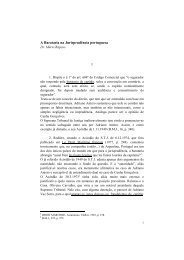


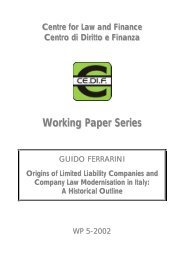
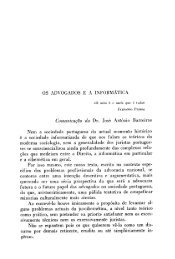
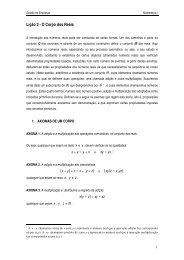

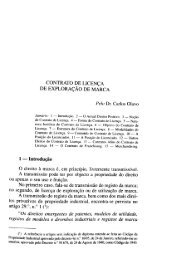
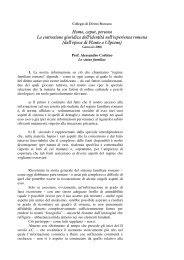
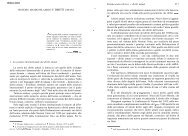

![Luigi Sapio Nozione di islām La parola “islām” [ ] è il mas.dar1 ...](https://img.yumpu.com/15836073/1/185x260/luigi-sapio-nozione-di-islam-la-parola-islam-e-il-masdar1-.jpg?quality=85)
